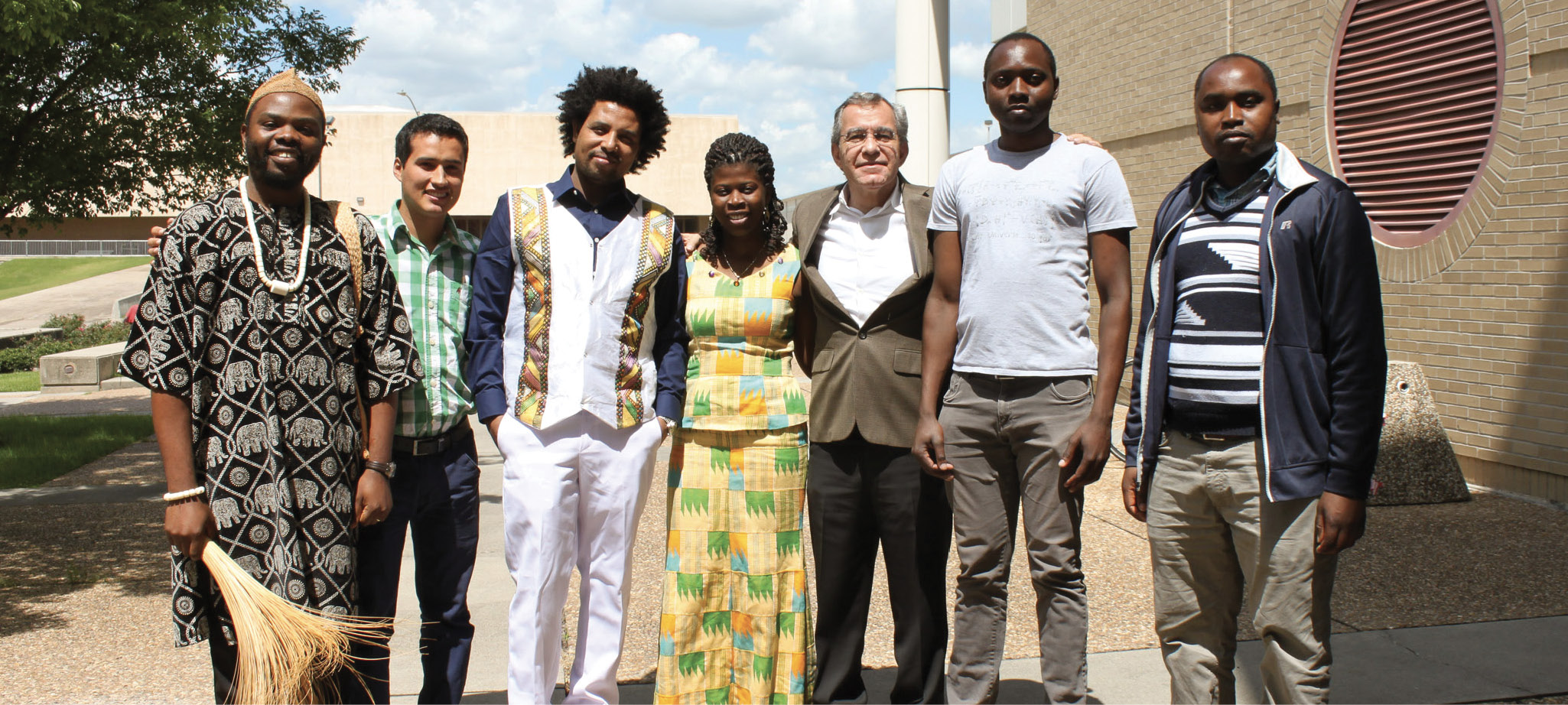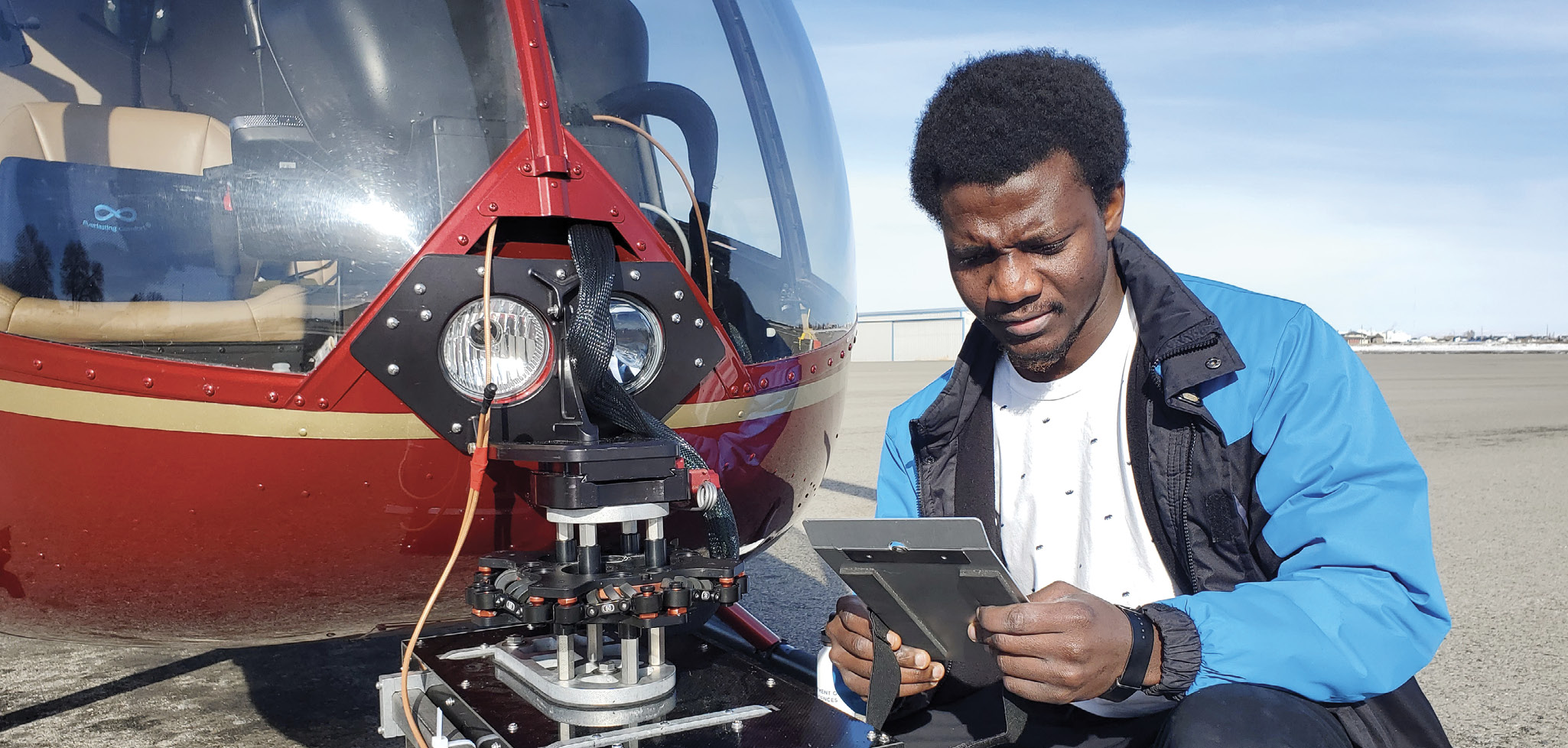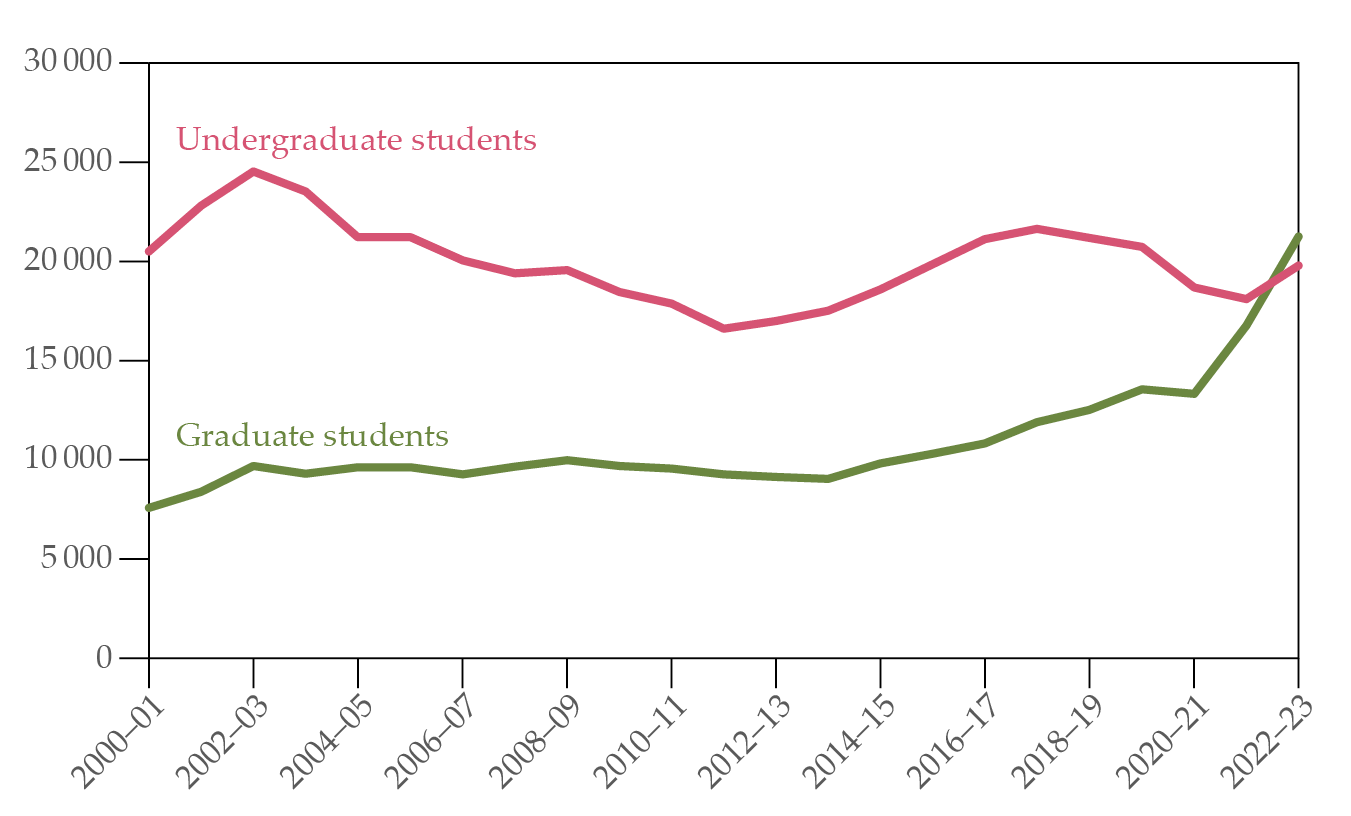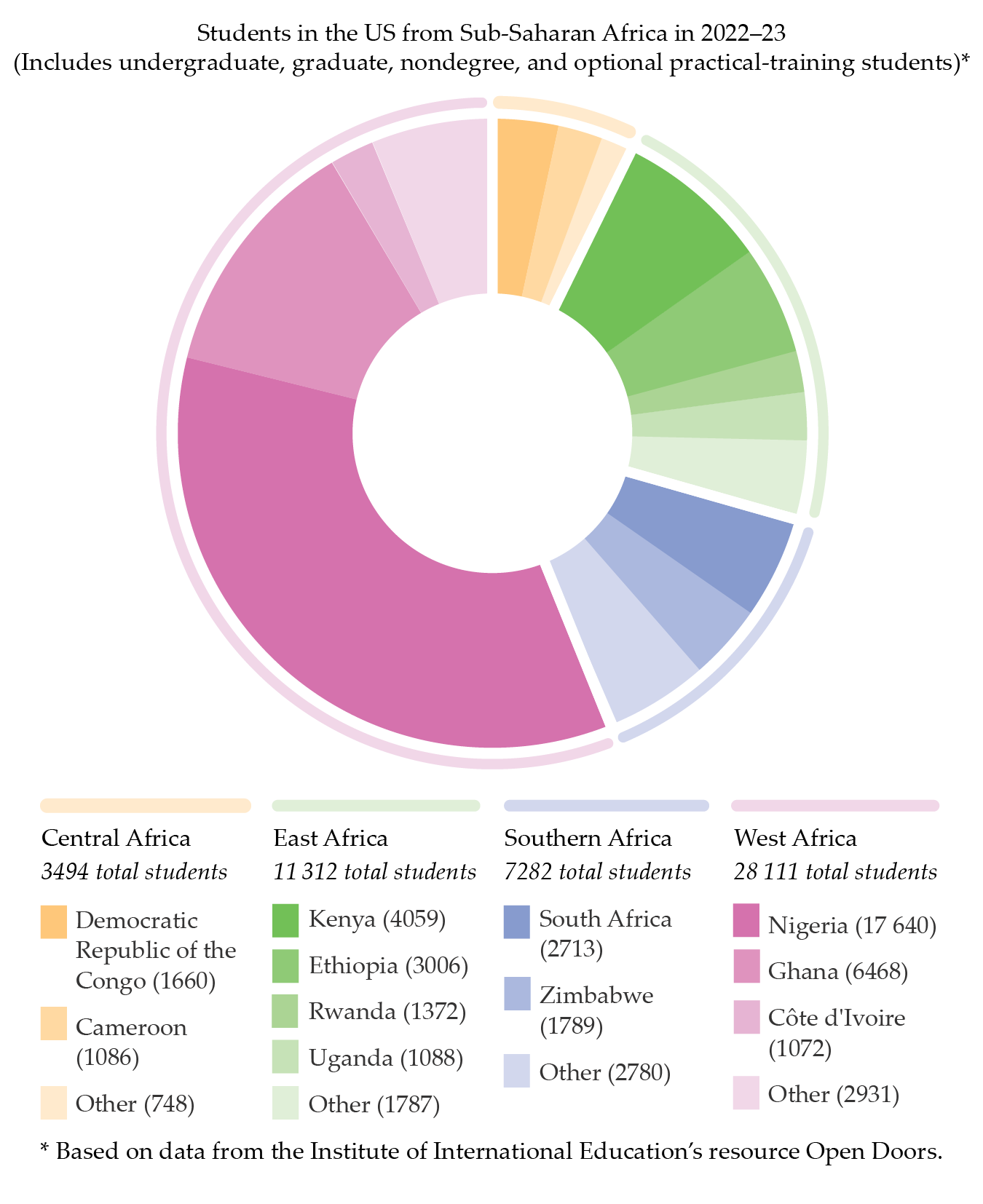More Africans are pursuing STEM graduate studies in the US
DOI: 10.1063/PT.3.5376
Armstrong Mbi earned his bachelor’s degree in his native Cameroon where, he says, Peace Corps volunteers who had taught him college math and physics inspired him to go abroad to pursue further studies. He applied to schools within driving distance from his brother, who lived in Atlanta and helped him navigate the application process. In 2004 he went to Mississippi State University to pursue a PhD in physics.
Mbi was one of 9622 graduate students in the US from Sub-Saharan Africa that year. Nearly two decades later, there were a record 21 237. Those numbers are from the fall 2023 Open Doors report by the Institute of International Education. The data are not broken down by field, but the report says that “most international scholars” specialize in science, technology, engineering, and mathematics (STEM) fields. At the University of Arizona, according to Kirsten Limesand, vice provost for graduate education and dean of the Graduate College, the number of international students pursuing graduate degrees in STEM rose from 805 in 2014 to 891 in 2023; during that same time, the number of African graduate students in STEM programs at the university jumped from 16 to 50.

Graduate students from Africa and elsewhere come to the University of Houston thanks to its close relationship with the Abdus Salam International Centre for Theoretical Physics in Italy. Houston physicist Carlos Ordóñez (third from right) has championed the connection. The students in this 2016 photo are (from left) Emmanuel Epie (Cameroon), Wilder Daza (Colombia), Eyob Kebede Chere (Ethiopia), Ivy Ahiabu (Ghana), Erick Buko (Kenya), and Armindo Samuel Cuamba (Mozambique).
UNIVERSITY OF HOUSTON

Data don’t exist for the paths that degree recipients from Africa take after they complete their PhDs abroad. Anecdotally, however, few return to the continent. Still, many try to use their education to help their home country. “The Industrial Revolution left people behind, including my country,” says Chibueze Amanchukwu, who is from Nigeria. He earned undergraduate and graduate degrees in the US and is on the engineering faculty at the University of Chicago. “The African continent is playing catch-up. How do we ensure that we are active in the next revolution? My resource is education.”
Conduits to international studies
In the past few years, some US-based researchers have taken to recruiting in Africa. “Boise State needed good students,” says Jodi Mead, a professor of applied mathematics at Boise State University. By her count, she has brought 15 PhD students to an interdisciplinary computing program there. “It’s hard keeping US citizens in the program,” she says, “because they can get jobs making more money doing less.”
Brian Kyanjo of Uganda was one of Mead’s first recruits. They met over Zoom during COVID-19 lockdowns when he took a course she was teaching in his master’s program at the African Institute for Mathematical Sciences (AIMS) in Rwanda. “She told me about the computing PhD program at Boise State, and I was convinced,” Kyanjo says. It helped that she told him not to worry about the visa and service fees. “You have to pay $180 for the visa, $100 for applications, $1500 for the flight. No African student has that money,” he says. Mead, says Kyanjo, “did something I never thought anyone would ever do: She sent me money just to help me get through the application process. It was from her own pocket.”
For her part, Mead, who is currently on rotation as a program director in NSF’s division of mathematical sciences, says she learned a lot from Kyanjo. “He said, ‘You can offer me a teaching assistantship, but I can’t get there. I don’t have the money.’” As a result, she says, Boise State started offering international graduate students early access to funds to cover fees and flights. “That is the key,” she says.
Solutions to the financial barrier for graduate students are patchwork. Some universities waive application fees. Sometimes campuses spring for a student’s visa fees and flights. At the University of Chicago, the Pritzker School of Molecular Engineering provides incoming PhD students with $2500 to help them make the move. Personal loans from advisers-to-be and from mentors at African institutes are also common. Hans-Peter Marshall, a snow scientist at Boise State, has three graduate students from Nigeria. “I lent one of them money after meeting him on Zoom,” says Marshall. He was confident that the student would be successful and would pay him back. “I’d done it before with neighbors in the community. They always pay back their loans.”

Naheem Adebisi is a graduate student from Nigeria working in the cryosphere geophysics and remote-sensing group at Boise State University. He installs, tests, and—during flights—operates an airborne light detection and radar system for surveying snow depth in the mountains in Idaho.
JOSH ENTERKINE

Many of the African applicants to Boise State and other US schools come from AIMS centers. The first was founded in 2003 in South Africa, and others are now in Cameroon, Ghana, Rwanda, and Senegal. At AIMS, faculty from around the world volunteer to teach three-week-long courses for intensive master’s programs. About 5% of the roughly 6000 student applicants—from all 54 African countries—are accepted to the standard AIMS program across all five centers each year, says Wilfred Ndifon, chief scientific officer of the AIMS global network and president of the AIMS Research and Innovation Centre, which opened in Rwanda last July. Some 30% of graduates leave Africa to pursue further studies, he adds. AIMS also offers smaller programs, including a master’s in artificial intelligence and a PhD in data science. (For more about AIMS and related efforts to strengthen education in Africa, see Physics Today, May 2008, page 25
Micheal Kahangirwe was at Makerere University in Uganda with Kyanjo. Kahangirwe won a scholarship to the ICTP–East African Institute for Fundamental Research in Rwanda, where he earned a master’s degree. (The ICTP is the Abdus Salam International Centre for Theoretical Physics in Trieste, Italy.) He is now at the University of Houston working on his PhD in theoretical nuclear physics. “The AIMS and ICTP programs give African students a good education so they can compete to get into good universities in the US,” says Kahangirwe.
Since the diploma program at the ICTP began in 1991, 35% of the 341 graduates from Africa have pursued further studies in the US; others have attended universities in Europe, the Middle East, South America, and Africa.
The pipeline of African students to the University of Houston goes back a decade and a half to connections forged between Houston theoretical physicist Carlos Ordóñez and Fernando Quevedo, the ICTP director at the time. Similarly, graduate students from Africa head to Michigan State University because of efforts by Pawel Danielewicz, a nuclear physicist. “We have had 10 in the past 10 years,” he says.
Danielewicz has taught at several AIMS centers and says that the students’ level of physics preparation tends to be low: “When I teach a graduate course in classical mechanics, it’s often at the level of easy undergraduate.” By contrast, he says, “the math level is often strong. And AIMS equips students with good coding and language skills.” Studying in the US is “such an opportunity for them,” says Danielewicz. “They work very hard. They are extremely determined to succeed. And they do.”
Brain circulation
Brain drain is a huge problem for Africa, says Kétévi Assamagan, a high-energy physicist at Brookhaven National Laboratory who came to the US from Togo in the early 1990s. “The fraction of Africans that stays outside is growing.” Often their home country can’t provide jobs commensurate with their skills. The ones who do get science jobs in Africa may feel professionally isolated from the international community, and the salaries are small—even if they are good in comparison to other salaries in the same country, Assamagan says. Some countries are politically unstable, “and even a scientist may not be completely free to express opinions.”
In Nigeria and Ghana—both among the top 25 countries of origin for international students in the US in 2023, according to the Open Doors report—good jobs for physicists exist, but the competition for them is intense, says Harriet Kumi. After earning her master’s degree in physics in Spain, Kumi went home to Ghana. “For a year, I couldn’t find work,” she says. “The only available jobs were teaching in junior high and high school. That is not what I wanted.”

Sub-Saharan Africa had the highest growth of students in the US of any global region in 2022–23 compared with the year before. The plot shows the numbers of undergraduate and graduate students in the US from Sub-Saharan Africa over time. (Based on data from the Institute of International Education’s resource Open Doors.)

Kumi taught high school for a year and applied to PhD programs. There are opportunities to study in Ghana, she says, “but mostly there is no funding. For me, it was easier to go to Europe.” She received a full scholarship and is now working on her PhD in nuclear physics at the University of A Coruña in Spain. “It would be better for their countries for people to go back, she says. “But they need opportunities.”
One of AIMS’s goals is to raise the level of education—and the economy—in Africa. The master’s program emphasizes to students that they should give back to the continent, says Ndifon. Rather than brain drain, he says, “we like to think of brain circulation.”
Ndifon, a theoretical biologist originally from Cameroon, earned his PhD at Princeton University; he is now based in Rwanda. “Many more Africans will return if they find jobs they see as dignified and fulfilling,” he says. AIMS, with African governments and other partners, is “setting the stage for many more such jobs to be created in Africa. So many of the skill sets that Africa needs are not available here. AIMS is like a portal.”
Arthur Musah has been in the US since he left Ghana in 2000 for his undergraduate studies in engineering at MIT. A lot of people from Africa don’t go back right away, he says, “but some go later, after they’ve learned how to run companies, encountered different managerial styles, and built networks, and they can make a mark.” Giving back to Africa was part of his motivation in making the film Brief Tender Light (see the story on page 22
Last summer Amanchukwu piloted a program for senior-level undergraduates in Nigeria to do research projects with the University of Chicago. The COVID-19 pandemic had shown him that students “could do research in virtual environments,” he says. “We had 100 applications for five spots.” The nine-week projects were mostly computational, for which the students gained access to the university’s servers. The two who joined Amanchukwu’s group used artificial intelligence, machine learning, and finite-element modeling to accelerate discovery of battery materials. At the end, Amanchukwu met the students in Nigeria, where they presented their results. “The model would work for other countries and other research topics,” he says.
In 2010 Assamagan cofounded the African School of Physics. The school meets in different locations across the continent for a few weeks every two years. “We tend to have a curriculum that goes from general physics to more specialized areas in nuclear high-energy physics, astrophysics, materials sciences, and applications,” says Assamagan. “We try to tailor the school to what the host country needs.” The next school is scheduled to take place in Morocco in July 2024.
More recently, Assamagan says, the school has expanded to host programs for high school teachers and students. In 2019 it launched a mentorship program that brings college students from Africa to Brookhaven to do research. Getting a visa to go to the US or Europe “is a formidable threshold” for Africans, Assamagan says. It seems that “visa-processing authorities at embassies assume the applicants will stay in the country and become illegal immigrants.”
As for Mbi, he says that “at some point during my graduate program, I had a crisis of identity. I am going to get a PhD and go back to Cameroon. What will I do there?” Parts of Cameroon are politically unstable, he says. “I heard that one of my undergraduate professors is now in the US driving a taxi.” Mbi left Mississippi State with a master’s degree and moved to Georgetown University for his physics PhD. He then earned a business degree from Cornell University. He remained in the US and has held several jobs in consulting and investment banking. He is currently a vice president in JP Morgan’s global research division. “When I came to the US,” he says, “I could solve equations, but I didn’t have a good sense of the landscape of physics. I didn’t know what I wanted for my career.”
“I mourn the brain drain that occurs in my home country,” says Mbi. “But I think there is a balance for individual fulfillment: What do I want to do with my life? Where is the best place to do that?”
More about the authors
Toni Feder, tfeder@aip.org







